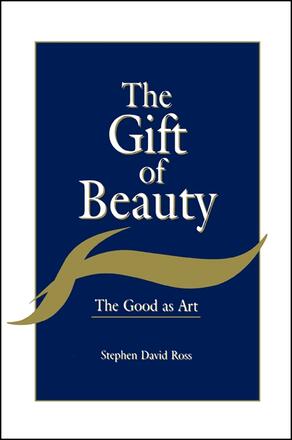
The Gift of Beauty
The Good as Art
Alternative formats available from:
Traces the history of the idea of art as an ethical movement, interpreting the good as nature's abundance, giving rise to an ethics of inclusion, expressed in art.
Description
Ross explores the developments in Western thought, from Plato and Aristotle through Kant and Hegel, when art was separated from science and philosophy. At the heart of the project is a reexamination of the good, found in Plato as that which makes being possible, which gives authority to knowledge and beckons to art, preserved in Levinas as infinite responsibility. The idea of the good is interpreted as nature's abundance, giving beauty and truth as gifts, calling us to respond. It gives rise to an ethics of inclusion, expressed in art.
Stephen David Ross is Professor of Philosophy and Comparative Literature at State University of New York at Binghamton. He is the editor of Art and Its Significance: An Anthology of Aesthetic Theory; and author of A Theory of Art: Inexhaustibility by Contrast; The Ring of Representation; Injustice and Restitution: The Ordinance of Time; Plenishment of the Earth: An Ethic of Inclusion; Perspectives in Whitehead's Metaphysics; Philosophical Mysteries; and Metaphysical Aporia and Philosophical Heresy all published by SUNY Press.
Reviews
"The book is a skillful celebration—and analysis in the service of the celebration—of 'the good' as that to which all 'oppositional' distinctions (in effect, discourse itself) point and by which it is 'enriched.' The theme is an important one and Ross explores it with poetic skill and an analytically canny close reading of the entire Western tradition—including, noticeably, certain radical feminist themes that belong to this larger picture. The boldness of Ross's book lies in the fact that he never relents: all distinctions fall under the 'es gibt,' where other discussants waver and make discursive distinctions in the name of the 'gift.' "— Joseph Margolis, Temple University
"Ross reconceptualizes links between a broad range of concepts: gifts, giving, beauty, good, economy, origins, art, judgment, mimesis, and so on. Rather than simply engaging a thinker on his own terms, Ross engages thinkers in their own terms, embraces their achievements and gifts, and then moves on to re-circulate these same figures from a standpoint that focuses on a different concern or set of concerns than his initial approach.
"He has written an eminently readable yet challenging book. As the text develops, one begins to grasp better, with each encountered 'interruption,' the subtle structures of the work. A thoughtful reading of the book will leave a reader with the impression that Ross is on the cusp of new developments in aesthetics, philosophies and theories of art, and some current discussions in moral philosophy." — Gayle L. Ormiston, Kent State University